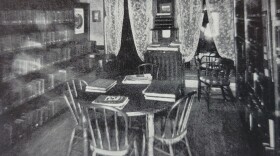Country and Western is a popular musical genre in the Northwoods. While it is generally accepted that country music developed in the American South, and particularly in Appalachia, there are other roots going off in many directions. Cowboy ballads and Western-style music is the most obvious, but there is another root that goes north into the logging regions. Lumberjack songs, which developed from French-Canadian folk tunes, are a part of the country music heritage. The instrument most used to accompany lumberjack songs was the fiddle, and perhaps the greatest fiddle virtuoso ever to come out of this tradition was a resident of Rhinelander.
Leizime Brusoe was born in Belleville, Ontario, Canada in 1870. He migrated to Michigan’s Upper Peninsula sometime around 1890, and in 1895 he married Sophia Hebert in Ironwood. In 1900 the couple relocated to the town of Pelican but soon moved into Rhinelander and took up permanent residence there. Brusoe became a naturalized citizen in 1918.
Brusoe earned a living as the owner-operator of the Brusoe Dray Line Service. In his later years, he served as caretaker of the Rhinelander Logging Museum. It was his knowledge of old-time logging camps that earned him the latter position, and he got this knowledge through music. Brusoe’s older brother taught him to play the fiddle at the age of six and he learned all the traditional songs of the lumber camps. Although he was unable to read music, he learned by ear and by the time he reached adulthood Brusoe was a recognized virtuoso with the violin.
Brusoe was a popular musician in Rhinelander but was little known outside of the Northwoods until 1926. In February of that year, the Chicago Herald and Examiner sponsored the Midwest Old Time Fiddlers’ contest in Chicago. People in Rhinelander recognized Brusoe’s skill, so the Outdoor Club held a fundraiser at the Majestic Theater to raise the $50 needed to pay his travel expenses. They exceeded the goal by $20, and Brusoe was off for Chicago.
The contest aired live over WEBH in Racine, Wisconsin, and it was as exciting a program as anyone could have hoped for. After all contestants had played, the judges split over two fiddlers: Brusoe and Peter Lennon of Chicago. After a lengthy playoff, the judges declared Brusoe the winner. For coming in first, Brusoe received $100 in gold, a silver trophy cup, and a vaudeville contract with the WLS National Barn Dance Troupe. Second place finisher Lennon acknowledged Brusoe to be “the best jig and reel player I ever heard in my life.”
As part of the National Barn Dance Troupe, Bruose played fiddle on the live radio show and at State Fairs and on theater stages across the Midwest. He also performed with Rube Tronson’s Cowboy Band.
In 1941, Brusoe took part in a University of Wisconsin project to record and preserve old lumberjack songs and music for the Library of Congress. He was a remarkable fiddle player and could reproduce music note perfect even if he had not played it in years.
Brusoe died in 1949 at the age of 78.
For years, WXPR hosted an annual fiddle contest that was part of the White Pine Jamboree. This fiddle contest was named after Leizime Brusoe.








